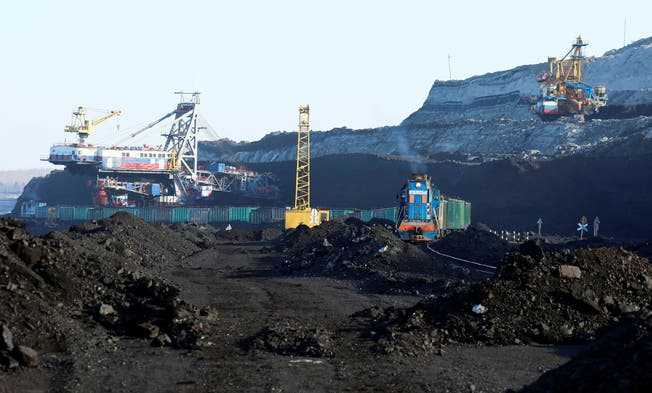The pictures from Bucha have led to the EU wanting to restrict energy imports from Russia for the first time. Brussels proposes a coal embargo. However, there is still no consensus in sight for the strictest measures.
Coal is the first energy source that the EU wants to ban from Russia.
The horror in the EU after the Bucha massacre is great. In response, the EU Commission is now proposing a fifth package of sanctions. And contrary to the ideas that were apparently originally rolled out for this purpose, the energy sector is now also included for the first time.
Crude oil, natural gas and coal are Russia’s most important export goods, but until now they have been deliberately left out by the EU countries. Germany, Italy, Hungary, Austria and other countries dependent on Russian energy wanted it that way.
Germany is moving a bit
Impressed by the atrocities committed by the Russian army in Ukraine, these countries have now moved at least a little. Germany is ready to give up coal. These are the easiest to replace and Berlin is planning to do without them completely by autumn anyway.
Due to the import ban, Russia loses 4 billion euros in revenue annually, said Ursula von der Leyen on Tuesday afternoon after the EU Commission meeting in Strasbourg video message on the latest sanctions package. This would cut off an important source of income for Russia.
A few hours earlier, after a meeting with his EU colleagues in Luxembourg, French Finance Minister Bruno Le Maire had already signaled that the member states would support the coal embargo.
“The 27 expressed their willingness to include the energy sector in the sanctions to an extent and according to a timetable to be determined,” said Le Maire, who chaired the meeting as a representative of the French EU Council Presidency, which will last until mid-year. As with all sanctions, a coal embargo requires unanimity.
In addition to coal, there could possibly also be oil. Von der Leyen said they are also working on sanctions related to oil imports. But she didn’t explain exactly what that means.
In addition, the EU also bans the import of other goods worth 5.5 billion euros, such as cement, wood, seafood and alcoholic beverages. This should not only stop financial flows from Russia and the so-called oligarchs, but also plug loopholes between Russia and Belarus.
There are also additional measures against the banking sector. The second largest Russian bank, VTB, and three other financial institutions are to be banned from all transactions. According to von der Leyen, the four companies have a market share of 23% in the Russian banking sector.
However, VTB has already been excluded from the Swift international payment system. And Russia’s largest bank, Sberbank, remains unmolested, as does Gazprombank, which is also state-controlled and important for the procurement of oil and natural gas.
This means that the EU continues to allow a large loophole in the financial sector so that Germany, among others, can pay for its natural gas imports. The German government and German industry fear catastrophic consequences in the event of a natural gas embargo, while various economists judge such a move serious but feasible.
Ships and trucks from Russia no longer welcome
In addition, Russian ships and ships operated by Russia will be banned from calling at EU ports. However, exceptions are made for essential items such as food, agricultural goods, humanitarian aid and energy. In addition, Russian and Belarusian transport companies are no longer allowed in the domestic market. So the Russian industry should be hindered in the procurement of important goods.
In addition, the EU bans the delivery of goods to Russia worth 10 billion euros. This affects quantum computers, the most technically advanced semiconductors, other machines and transport equipment.
Finally, Russian companies will be banned from public procurement in the single market, all EU and Member State support for Russia’s public bodies will be banned, and more Russians will be added to the sanctions list.
Von der Leyen ended her video message in a somewhat unusual way with the words “Glory to Ukraine” used in many speeches by Ukrainian President Volodymyr Zelensky.
A barrage of EU sanctions against Russia
The EU assets of Russian President Vladimir Putin, Foreign Minister Sergei Lavrov and other wealthy Russians close to Putin have been frozen. The sanctioned persons have an entry ban.
Personal sanctions were extended to high-ranking Belarusian military personnel for their involvement in the war.
A total of 877 people and 62 organizations are affected (Status: April 5, 2022). Among them are 351 members of the Russian State Duma who voted for the independence of the self-proclaimed republics of Donetsk and Luhansk.
The central bank’s access to its reserves abroad is restricted.
Seven banks will be excluded from the Swift financial information system, including the second largest Russian bank, VTB.
The Russian state’s access to the EU’s capital and financial markets is restricted.
Participation in investments with the state fund Russian Direct Investment Fund is prohibited.
Euro cash may only be brought to Russia in small amounts and in exceptional cases.
The export of certain goods and technologies to Russia is prohibited.
Imports from the non-government-controlled areas of Donetsk and Luhansk are prohibited.
The Russian aviation industry is no longer allowed to use EU airspace. This also applies to machines rented and operated by Russians.
The Russian government-controlled media outlets Sputnik and Russia Today have been banned from broadcasting in the EU.
The import of certain goods such as oil, wood, cement and steel from Belarus is prohibited, as is the export to Belarus of so-called dual-use goods that can also be used for military purposes.
There are also other sanctions that have been in place since Russia illegally annexed Ukraine’s Crimea peninsula in 2014.
